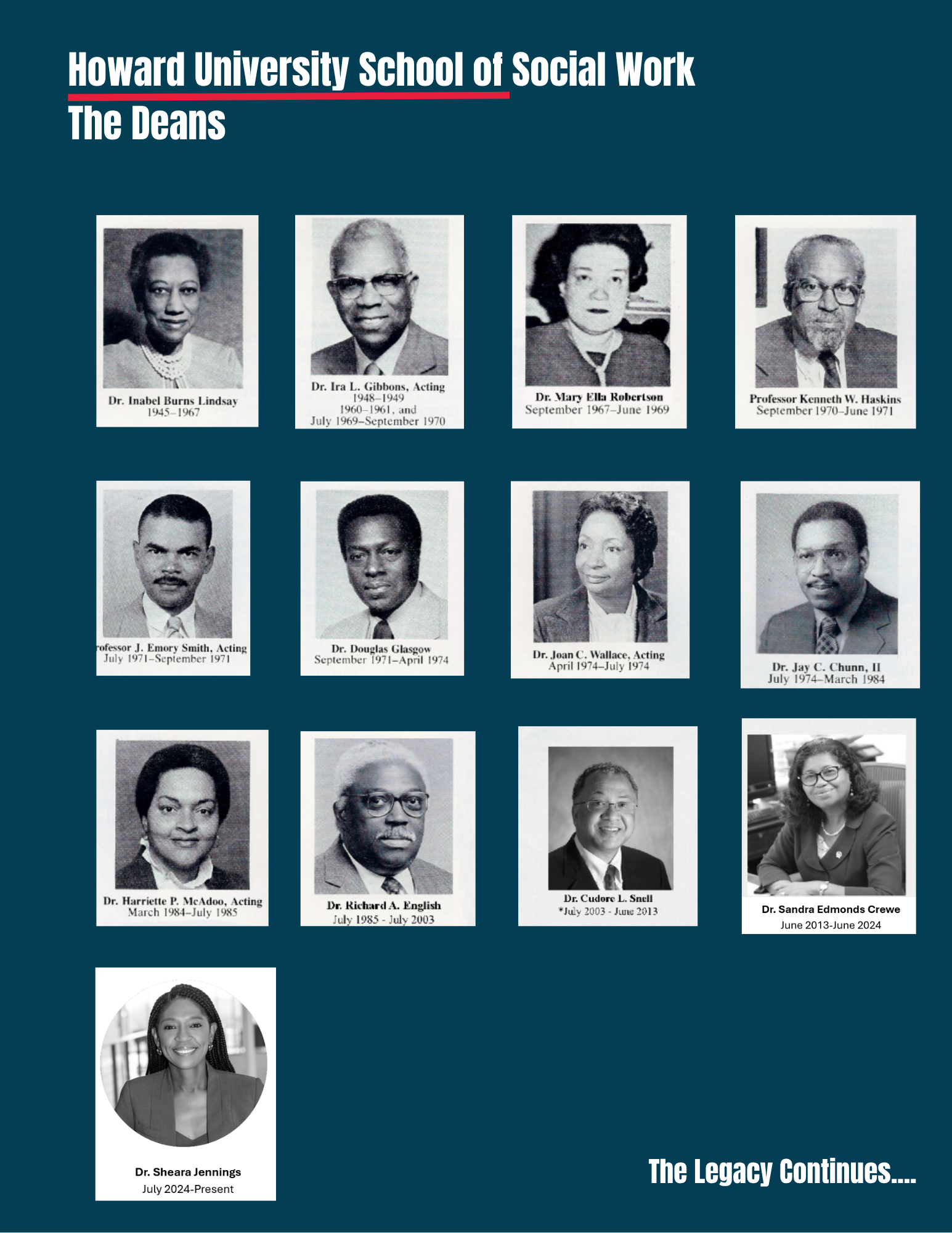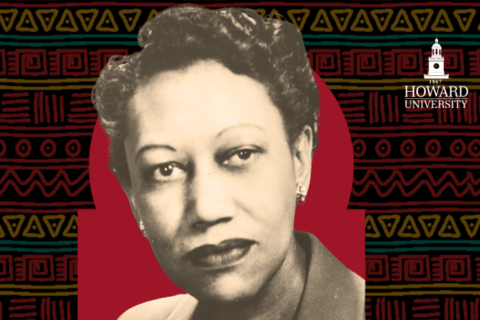History
The Howard University School of Social Work (HUSSW) has a rich history, deeply rooted in the broader mission
of Howard University to promote social justice and equality. Although social services instruction at Howard dates back to 1914, HUSSW was formally established as an autonomous unit in 1935. The groundwork for the school was laid by notable advocates for social work education within the University, such as Lucy Diggs Slowe, Howard's first Dean of Women, and Dr. E. Franklin Frazier, Chairman of the Department of Sociology.
Dr. Frazier was instrumental in shaping social work education at Howard. He directed the first "basic curriculum" for Social Work within the Department of Sociology, building on his previous experience as Director of the Atlanta University School of Social Work. A trailblazer in the field, Dr. Frazier advocated for rigorous standards for social work training, ensuring that the program at Howard conformed to the 1932 accreditation standards set by the American Association of Schools of Social Work, the forerunner of today’s Council on Social Work Education (CSWE).
In 1937, Dr. Inabel Burns Lindsay joined the faculty and later became the founding Dean of HUSSW, leading the school from 1945-1967. Lindsay, a pioneer in the fields of social work and education, viewed social justice through a sociocultural lens. She worked tirelessly to ensure that social workers entering the workforce reflected the diversity of the world around them, placing race and gender-based issues at the forefront of social work education. HUSSW Dean Emerita and Professor Sandra Edmonds Crewe, Ph.D., remarked, “[Dr. Lindsay’s] transformational leadership allowed for a social work program second to none... Dr. Lindsay was a leader of leaders. When challenged by racism within the profession, she insisted that the profession of social work honor its social justice values.”
Known for her commitment to excellence, Dean Lindsay held her students to the highest standards and aimed to make Howard's School of Social Work a leading institution. Following her tenure, thirteen Deans have continued her legacy.
Learn More About Inabel Burns Lindsay
Howard University The Dig, February 22, 2024
Founding Dean of School of Social Work: Inabel Burns Lindsay, Social Justice Champion and Innovative Leader.
HUSSW: A Look Back In Time
1930s
The establishment of formal instruction in social work education at Howard University emerged during a critical period in American history. It coincided with the Great Depression of the 1930s, the enactment of the Social Security Act of 1935, the emergence of large-scale public social services and the onset of World War II. These historic developments provided a strong impetus for the development of social work education at Howard. Additionally, there was a strong appeal for social work education at Howard from African Americans employed in the District of Columbia's New Deal programs. Few of the recognized schools of social work in America - and none in Washington - D.C. were open to qualified African American applicants. A 1932 study undertaken at the request of the Washington Council of Social Workers revealed that of 69 persons newly employed as social workers only five were graduates of schools of social work, 10 had completed one course in social work training and the rest were completely untrained. The lack of training was largely attributable to the lack of educational opportunities for Blacks, who constituted the largest number of persons seeking social work education among the emerging social welfare workforce in Washington.
1940s
In 1942, Howard University's social work program became a division of the Graduate School of Arts and Sciences. It remained in the Graduate School until an autonomous professional school was established within the University at the beginning of l945-l946 academic year. Dr. Lindsay was appointed the first dean of the newly established School of Social Work. Early accreditation (l930-1940) of the one-year Certificate Program of the Division of Social Work in the Graduate School was superseded by full accreditation of the new two-year Master of Social Work degree program by the time the first graduates received their degrees in June 1946.
1970s – 1990s
During the 1970s, social work at Howard expanded to include baccalaureate and doctoral level education. In the 1990-1991 academic year, the dean and faculty recommended to the Board of Trustees that the School's Bachelor of Social Work degree program be discontinued. The decision was based on three factors: (1) interest in strengthening graduate and post-doctoral education, and research at the master's and doctoral levels; (2) limited resources; and (3) low enrollment in the baccalaureate program. Additionally, the School placed a strong emphasis on scholarly publications and research.
The School received its most recent reaffirmation of accreditation of the master's degree program in 2020 for the maximum 8 years. We are accredited through 2028. The influences which led to the development of social work education at Howard University were both internal and external. The intellectual impulse to provide the best education possible for those working in the public social services continues as a dominant theme in the School's mission, objectives and outcomes for students. The School remains concerned about the welfare and well-being of African American people and others who are poor, oppressed and disadvantaged in society. The Black perspective, which includes the Black Diaspora, serves as a base for a set of guiding principles, undergirding our curriculum and informing our knowledge development and research activities and social policy initiatives.
Over the years as the social work profession and social welfare institutions have evolved in response to changes in American society and throughout the world, the Howard University School of Social Work has progressed as well.
2000 – Present
In 2010, The School of Social work instituted its Alternative Spring Break and International Student Learning partnership in Cape Town, South Africa. To date over 100 students have attended this program along with faculty. The program emphasizes human rights.
In 2015, the School of Social Work celebrated 80 years of social work education. During this year long celebration, Alumna John Jacob presented the school with the John and Barbara Jacob endowed professorship. The celebration also included a conference that highlighted alumni and faculty who have invested in our legacy. See more details here.
Today the School of Social Work is a more complex institution than ever before. The curriculum is richer and enhanced by new courses, electives and concentrations. We have a number of course offered online. The student body is more diverse in terms of family background, geographic origin, nationally and internationally, age and persons with disabilities. Teaching remains the core faculty activity, however, research, knowledge development, training and technical assistance have become important areas of faculty activity. Research, knowledge development and funded projects are major aspects of the life of the School. The Presidential Commission on Academic Renewal (PCAR) ranked both the MSW and PhD as top programs at the University.
In 2024, the U.S. News and World Report ranked HUSSW in the top 5% of social work programs of the more than 300 graduate social work programs in the U.S.
The goals of the School are to continue on the pathway of excellence as defined by our history and mission, and build upon past and present achievements. Our vision of linking practice, policy and action with research is being pursued through the E. Franklin Frazier Center for Social Work Research and the Multidisciplinary Gerontology Center. Long-range planning and capital development are underway to further the goals of building endowments to support the core academic programs, faculty and students, doctoral and post-doctoral education, international programs, continuing education, distance learning and enhanced learning resource facilities.
The Deans

Historical List of Deans
| Name | Years Served |
|---|---|
| Dr. Inabel Burns Lindsay | 1945-1967 |
| Dr. Ira L. Gibbons, Acting | 1948-1949, 1960-1961 and July 1969- September 1970 |
| Dr. Mary Ella Robertson | September 1967- June 1969 |
| Professor Kenneth W. Haskins | September 1970- June 1971 |
| Professor J. Emory Smith, Acting | July 1971- September 1971 |
| Dr. Douglas Glasglow | September 1971- April 1974 |
| Dr. Joan C. Wallace, Acting | April 1974- July 1974 |
| Dr. Jay C. Chunn, II | July 1974- March 1984 |
| Dr. Harriette P. McAdoo, Acting | March 1984- July 1985 |
| Dr. Richard A. English | July 1985- July 2003 |
| Dr. Cudore L. Snell | July 2003- June 2013 |
| Dr. Sandra Edmonds Crewe | June 2013- June 2024 |
| Dr. Sheara Jennings | July 2024- Present |

